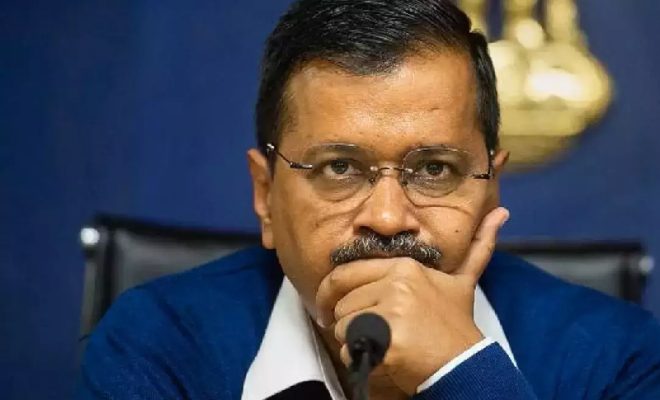ED to present Delhi CM Kejriwal before court in excise case

The arrest of Arvind Kejriwal, the Chief Minister of Delhi and a noticeable figure in Indian legislative issues, sent shockwaves through the country. It was the summit of an arrangement of occasions activated by the Enforcement Directorate (ED), which had been examining affirmed abnormalities encompassing the rejected Delhi extract approach of 2021-22. Kejriwal, known for his anti-corruption position and grassroots legislative issues, found himself at the center of a legitimate storm as ED authorities conducted looks at his official home on Flagstaff Road within the Civil Lines range of Delhi.
The examinations leading up to Kejriwal’s arrest had been continuous for a few times, with the ED scrutinizing different angles of the exact approach and its usage. The choice to capture the Chief Minister marked a critical acceleration within the test and raised questions about the potential suggestions for Delhi’s political scene.
Legitimate Procedures and Custodial Cross Examination
After his arrest, Arvind Kejriwal was slated to be created some time recently by an extraordinary Prevention of Money Laundering Act (PMLA) court by the Enforcement Directorate. The organization looked for his remand for custodial cross examination, citing his alleged non-cooperation within the examination and the ought to discover his individual association with his alliance, the Aam Aadmi Party (AAP) within the affirmed abnormalities.
The court appearance was anticipated to be a significant minute within the lawful procedures, with the ED showing its case for looking for Kejriwal’s care. The agency’s request for custodial cross examination underscored the significance of the affirmations and the complexity of the case. Kejriwal’s legitimate defense group, in any case, promised to challenge the ED’s activities, upbraiding them as politically spurred and declaring the Chief Minister’s blamelessness.
Affirmations and Encounter with Denounced
Central to the ED’s examination were affirmations of indecency and debasement surrounding the Delhi extract approach. The office charged that people included within the case were in communication with Kejriwal for defining the arrangement, which purportedly brought about undue benefits for them. In return, it was alleged that kickbacks were paid to the AAP, embroiling the Chief Minister and his party within the embarrassment.
The ED too communicated its purpose to stand up to Kejriwal with other captured individuals and witnesses, including BRS leader K Kavitha. This move was pointed at unraveling the complexities of the case and setting up the degree of Kejriwal’s inclusion. Kejriwal’s lawful team remained enduring in their defense, challenging the lawfulness of the ED’s activities and keeping up that the Chief Minister had no part in any wrongdoing.
Security Measures and Open Reaction
Within the repercussions of Kejriwal’s arrest and the ensuing legitimate procedures, security was fixed around key areas in Delhi, including the ED office at A P J Abdul Kalam Road and the Chief Minister’s official home. Delhi Police staff and central armed police forces were conveyed to oversee the circumstance, raising extra blockades and shaping a security cordon around the premises.
The improvements encompassing Kejriwal’s arrest earned far reaching consideration from the media and the public, starting wrangles about almost the state of governance and responsibility within the nation. Supporters of the Chief Minister energized behind him, announcing his guiltlessness and criticizing what they saw as a politically motivated witch chase. Alternatively, faultfinders seized upon the affirmations as proof of systemic debasement and malfeasance inside the political foundation.
The arrest of Arvind Kejriwal and the consequent lawful procedures spoken to a basic crossroads in India’s political scene. The allegations leveled against the Chief Minister and the AAP underscored the challenges of combating corruption and maintaining straightforwardness in administration. As the case unfolded, all eyes remained solidly settled on the court, where the destiny of one of the country’s most conspicuous political figures hung within the adjust.
Pre-Election Arrest
The timing of Kejriwal’s arrest has infused a component of show into the political account. Police accompanied by individuals of the Enforcement Directorate office, encompassed Kejriwal’s home as part of a lookout operation. This exceedingly publicized occasion has increased pressures and escalates examination of the government’s activities within the lead-up to the race.
Approach Contention
At the center of the debasement charges lies a questionable liquor deals approach executed by the Delhi government in 2022. The arrangement, which checked the conclusion of the government’s imposing business model over liquor deals, has been a subject of dispute since its initiation. Faultfinders contend that the arrangement unreasonably favors private retailers, giving them undue preferences within the showcase. The Enforcement Directorate’s examination is centered on deciding whether Kejriwal’s organization is locked in degenerate homes whereas defining and executing this approach.
Political Aftermath and Counterclaims
The arrest of Kejriwal has activated a whirlwind of political responses and counterclaims. The AAP has denounced the BJP for turning to “grimy legislative issues” and utilizing state teaching to irritate its political rivals. Kejriwal’s supporters see his arrest as a frantic endeavor by the administering party to weaken his impact ahead of the decisions. In reaction, the AAP has reported its intention to look for a critical hearing at the Supreme Court to secure Kejriwal’s discharge and challenge the authenticity of the charges leveled against him.
Also Read | Understanding the Controversy: Viksit Bharat Messages and Election Regulations
The Broader Political Setting Encompassing
Kejriwal’s arrest underscores the tall stakes of the upcoming general race. With the BJP looking to preserve its grasp on control and the restriction parties, counting the AAP, competing to challenge its dominance, each improvement is being closely scrutinized for its potential effect on the appointive result.
Concerns Over Democracy
Kejriwal’s arrest isn’t a disconnected occurrence but a portion of a broader slant of political repression and terrorizing in India. Resistance parties have raised concerns about the BJP government’s charged abuse of state teaching for political purposes. The focusing on restriction pioneers through lawful and administrative instruments has raised questions about the wellbeing of India’s popular government and the fair-mindedness of its education. The arrest of Arvind Kejriwal on debasement charges relating to liquor deals has escalated the political dramatization in India ahead of the common decision. The affirmations, refusal, and consequent lawful fight emphasize the furious competition and increased pressures characterizing Indian legislative issues. As the nation braces for a significant discretionary challenge, the result of Kejriwal’s case and its broader suggestions for popular government will be closely observed by eyewitnesses both inside India and overseas.



